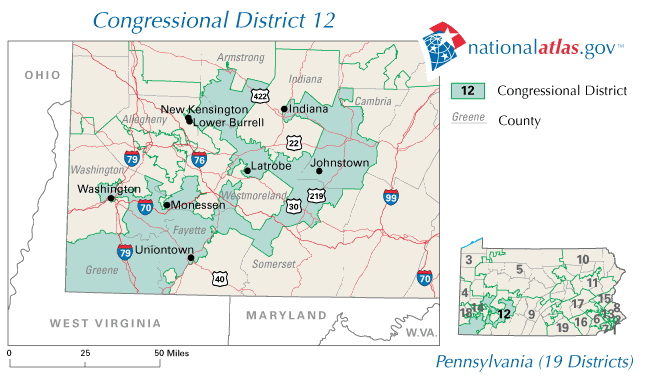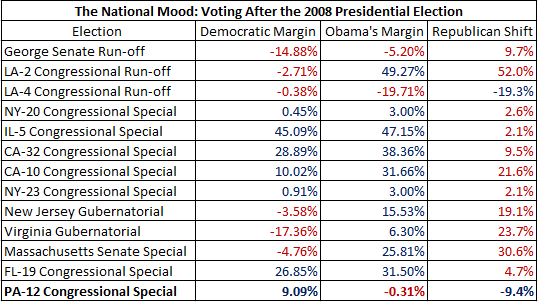Cross-posted at Politics and Other Random Topics
A little while back, ThinkProgress’s Matt Yglesias made a very good point about how it’s kinda weird that the media and many others are arguing that there is some sort of broad “anti-incumbency” mood going on in the country.
Yglesias writes:
There’s something inherently odd about the concept of an anti-incumbent wave in a country wherein the overwhelming majority of incumbents are invariably elected. In the 2008, for example, 23 House incumbents were defeated in an unusually eventful election. A year in which “only” 75 percent of incumbents running for re-election were successful result in a shockingly large amount of change in the House. Indeed, I think everyone regards such a scenario as wildly unrealistic. And yet it would be hard to describe a universe in which 75 percent of incumbents are re-elected as all that gripped by anti-incumbent sentiment.
The interesting thing is that both 2006 and 2008 are largely seen as being both anti-Republican and anti-Incumbent (2008 moreso than 2006), but by absolute numbers, the number of incumbents who lost and the number of seats where the incumbent party switched are actually pretty low. A lot of people might be asking the obvious question; how can you say that 2006 and 2008 weren’t extremely anti-incumbent? After all, those two years saw the House, the Senate, and the Presidency switch from the Democrats to the Republicans. Before delving further, I’m not saying that the most recent elections weren’t extremely significant and that there wasn’t a massive change in control of government, but I am saying that this did not happen because incumbents had been thrown out left and right (especially in the House of Representatives). I’m going to work on a series which involves looking at the last two elections (both of which were Democratic wave elections) to try and give some perspective to the “anti-incumbent” myth which pervades the House of Representatives.
(I’m going to insert the charts a bit later in this post, for now, just follow the cross-posted link, that will give you the pictures)
So, how well did incumbents (and incumbent parties) fare in 2006? According to the electoral compilation site The Green Papers, in the 2006 House elections, there were 390 incumbents running in the general election. Of those 390 incumbents, 22 lost their bid for re-election, of 435 seats, 31 seats were not held by the incumbent party (1 belonging to now-Senator Bernie Sanders (I-VT)). Roughly 94% of incumbents who were renominated by their parties ultimately went on to win the election. When including all seats, 368 incumbents won re-election to the House of Representatives out of 435, which means that the 110th congress started out being made up of 85% of members who had served in the previous congress. Looking at the seats in which the incumbent party retained control of the seat they had before the election, that number is 404 out of 435 seats, or roughly 93% of all seats (meaning only 7% of seats switched control in 2006).
If we look at it from the perspective of the two parties, there were 202 Democratic incumbents, 232 Republican incumbents, and 1 independent incumbent. Of the 202 Democratic incumbents, 186 got their party’s nomination, and all of them won re-election (or 100% of all Democratic incumbents who were re-nominated won re-election). Of the 233 seats the Democratic party won after the elections, roughly 80% of those would be held by an incumbent member. Looking at the Republicans, out of 232 incumbents, 204 of them were successfully re-nominated and of those who were re-nominated, 182 won won re-election (or roughly 89% of those running for re-election). Of the 202 seats the Republican party won after the elections, roughly 90% of them were held by were held by incumbents.
Some of you might be asking why I’m not talking about incumbents who lost their primaries? After all that might skew these numbers. The reason is pretty simple, only 2 incumbents who sought re-nomination lost their bids (Republican Joe Schwarz (MI-07) and Democrat Cynthia McKinney (GA-04). That means that over 99% of incumbents who sought re-nomination by their party were successful (all the primaries haven’t ended yet yet, but 2010 appears to be heading in that direction again).
One might argue that 2006 wasn’t really an “anti-incumbent” year so much as it was an “anti-Republican” year (not even necessarily an anti-Republican incumbent year) but even granting that, it’s still pretty telling that what many considered to be a giant wave election, when only 7% of all seats (13% of all Republican seats) changed party hands. This should give a little more insight into American elections.
Next time: the 2008 House races.


